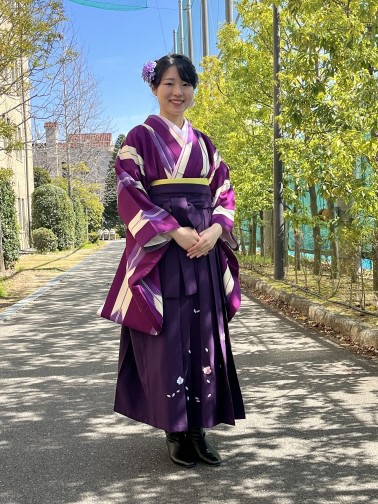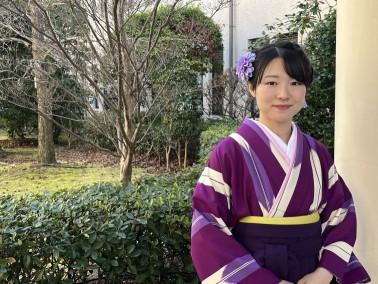2023.03.28.
2022年度卒業生インタビュー①的場なるみさん / Interview with Alumni AY2022 (1): Ms. Narumi Matoba

2022年度国際学部卒業生の的場なるみさんに、国際学部の魅力について語っていただきました。的場さんは、4月から大手百貨店に勤務される予定です。
①国際学部で学んで良かったと思うことは?
歴史学や政治学、文化人類学の面白さに気付けたことです。
国際学部では、年号や名称を覚えるのではなく、「なぜこの出来事が起きたのか」「どう問題になっているのか」など、出来事の裏にある「なぜ」を徹底的に明らかにし、意見を形にする力を養います。
自分はどう考えるのか、なぜそう思うのかを言語化することを常に求められる中で、次第に歴史や政治について学ぶことが楽しいと思うようになりました。国際問題の現状を知る力だけでなく、過去を掘り下げて将来を想像する力は、これからも一生役に立つものだと思っています。
また、その後の卒業論文ではシンガポールの政治をテーマとし、シンガポールが実質的な一党支配体制となった歴史背景や、その政治体制が変化しつつある理由について研究を行いました。入学当初の自分では信じられないテーマですが、国際学部での学びが自分の興味を広げたのだと思います。
国際学部で学んでいなかったら、わたしは一生政治や歴史に興味を持てないままでした。国際学部で自分の視野を広げることが出来て、本当に良かったです。
②最も印象に残った授業は?
最も印象に残った授業は3つあります。
まず1つ目は、『国際社会論基礎』です。
「国家とは何か」「民族とは何か」という多義的で曖昧な概念を、移民問題やグローバル化など実際の事例を通して紐解いていく授業でした。
この授業を受けたことで、ひとつの国際社会問題の中に複雑に絡まり合う国家や民族、政治の姿に興味を持つようになりました。
2つ目は、『グローバル・ガバナンス論』です。一国だけでは解決出来ない、国境を越える問題に焦点を当て、国から個人に至るそれぞれのアクターがどのように行動したのか、その後どのような結果がもたらされたのかを学ぶ授業でした。 この授業の「国家が上から変革を起こすこともあれば、ひとりの国民の動きが国全体に大きな影響を与えることもある」という視点は、ゼミ選択や卒業論文のテーマを選ぶきっかけとなりました。
また、この授業を受けたのがまさに新型コロナウイルス感染症によって日常生活が一変した時期だったため、身近に感じる事例が多くあり、より一層興味を持って受講出来たと思います。
3つ目は、『クリティカルシンキング』です。
「AはBであると言える場合、BはAであると言えるか」など、一見言葉遊びのように感じる題を扱いながら、文章を批判的に読む力を鍛える授業でした。
この授業を受けたことで、文章を読むときに「これは本当に正しいと言えるのか」を常に考えるクセがつき、その後のレポート執筆においても、飛躍のない論理展開が出来るようになりました。
③国際学部に入学を考えている人へのメッセージをお願いします。
国際学部は、自分が学びたいと思うことを何でも学べる場所です。私は1年生の最初に政治学・歴史学・文化人類学に興味を持ち、その知識を深める方向で履修を行いましたが、その他にも言語学、会計学、経済学、観光学など様々な分野を幅広く、横断的に学べるのが国際学部の魅力だと思います。
また、留学に行く機会も十分に用意されているので、国際学部で得た視点を留学先で活かすことも出来ると思います。 「国際学が学びたい!」という人にはもちろん、「あれもこれも興味があって、決めきれない」という人にも勧めたい学部です。

We asked Ms. Narumi Matoba, a 2022 graduate of the School of International Studies (SIS), about the appeal of the SIS. Ms. Matoba will be working for a major department store from April.
(1) What was the best about studying at the School of International Studies?
I found history, political science, and cultural anthropology interesting.
In the SIS, instead of memorizing years and names, students thoroughly clarify the "why" behind events, such as "why did this event happen?" and "how is this an issue?" and develop the ability to formulate opinions.
As I was constantly asked to verbalize what I thought and why, I gradually came to enjoy learning about history and politics. Understanding the current state of international affairs, delving into the past, and imagining the future will be helpful for the rest of my life.
For my graduation thesis, I focused on Singaporean politics, researching the historical background of the country's substantial one-party rule system and the reasons for the current changes in that political system. I would never have believed I would choose the topic when I first entered the school, but my studies at the SIS broadened my interests.
If I had not studied at the SIS, I would have remained uninterested in politics and history for the rest of my life. I am delighted that I was able to broaden my perspectives at the SIS.
(2) What was the most memorable course subject in the School of International Studies?
Three courses left the most remarkable impression on me.
The first is 国際社会論基礎 (Fundamentals of Transnational Society.)
In this course, we explored the ambiguous and multifaceted concepts of "what is a nation" and "what is an ethnic group" through actual cases such as immigration and globalization.
This class interested me in the complex intertwining of nations, ethnic groups, and politics in a single international social issue.
The second is グローバル・ガバナンス論 (Governance of Global Community.) This course focused on transnational issues that cannot be solved by one country alone and studied how each actor, from the state to the individual, acted and the subsequent results.
The perspective of this course, "a nation can initiate change from above, while the actions of a single citizen can have a major impact on an entire country," inspired me to choose a seminar and a theme for my graduation thesis.
In addition, since I took this course at a time when the spread of COVID-19 entirely changed our daily life, many of the cases were familiar to me, and I was able to take the course with even greater interest.
The third course was クリティカルシンキング (Critical Thinking.) We learned to read texts critically by dealing with questions, such as "If A can be said to be B, can B be said to be A?” that seemed like wordplay.
This course helped me develop the habit of always thinking, "Is this really true?" when reading texts. It also enabled me to build logic without leaps and gaps when writing reports.
(3) Please give a message to those who are considering enrolling in the School of International Studies.
The School of International Studies is a place where you can learn whatever you want to learn.
While I became interested in political science, history, and cultural anthropology at the beginning of my first year and took courses to deepen my knowledge in these fields, the SIS offers a wide range of areas of study, including linguistics, accounting, economics, and tourism, among others intersectionally.
There are ample opportunities to study abroad so that students can use the perspectives they gain from the SIS in their study abroad destinations. So I recommend the SIS to those who say, "I want to study international studies," but also to those who say, "I am interested in so many things that I can't decide which one I want to study."

